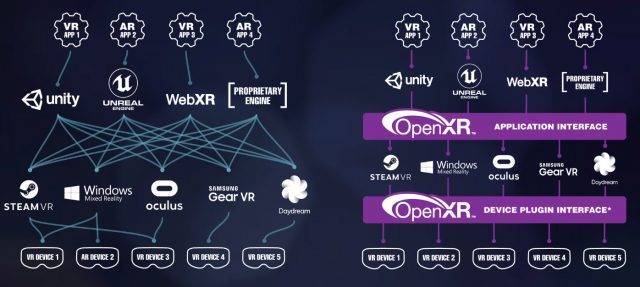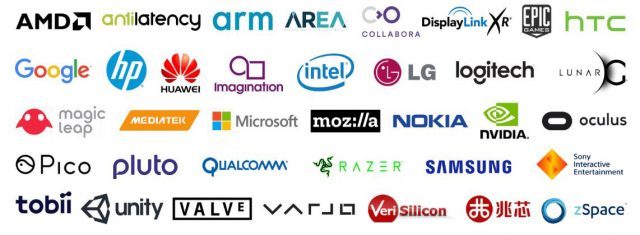
OpenXR, a widely supported initiative which aims to streamline AR/VR development across headsets and platforms, has reached its 1.0 release today. It’s a major milestone, according to Khronos Group which has overseen development of the standard by a consortium of many of the biggest names in the AR/VR sector.
OpenXR is a royalty-free standard that aims to unify the underlying connections between VR and AR hardware, game engines, and content, making for a more interoperable ecosystem. The standard has been in development since April 2017 and is presently supported by virtually every major hardware, platform, and engine company in the VR industry, including key AR players like Magic Leap. OpenXR’s ‘working group’, under which representatives from member companies have been actively developing the standard, is facilitated by Khronos Group.
Today the group announced the release of OpenXR 1.0, representing the first production-ready version of the standard. Khronos Group says that from 1.0 forward, OpenXR will retain “full backwards compatibility […], giving software developers and hardware vendors a solid foundation upon which to deliver incredible, portable, user experiences.”
OpenXR has both an application interface (which sits between an XR app and platform), and a device interface (which sits between the platform and the headset). Building apps, platforms, and headsets which singularly target the OpenXR standard (instead of a myriad of proprietary interfaces) makes for a significantly more interoperable ecosystem.

For instance, it means that an app built for one OpenXR headset should run on an entirely different OpenXR headset with zero changes to the underlying code. Additionally, it means that a new entrant to the game engine market could swiftly add support for all compatible headsets by implementing support for OpenXR, instead of dozens of individual headset runtimes.
Granted, OpenXR does not necessarily mean that apps and content from one platform will work with a headset from another. Each company, even if a supporter of OpenXR, still has control over where their content is made available and which platforms support which headsets. Simply put, OpenXR is a technical foundation for interoperability, but business decisions still dictate content, device, and platform strategy.
OpenXR 1.0 is now available on GitHub. A reference guide published by Khronos Group gives a high-level technical overview of the API’s structure.
Moving forward, the next step is for engine, headset, and content makers to release implementations which support OpenXR.
Microsoft has released initial support for OpenXR on both HoloLens and Windows VR headsets, and Collabora has released its Monado open-source Linux OpenXR runtime. Epic says that it has previously implemented OpenXR 0.9 support in Unreal Engine and plans to update the engine for the 1.0 release. Oculus has committed to bringing OpenXR runtime support to both Rift and Quest later this year.

Other companies who are officially part of the group responsible for developing OpenXR—like AMD, ARM, NVIDIA, HTC, Valve, Unity, and others—voiced support for the 1.0 release of OpenXR but haven’t yet announced a timeline for their own implementations.
























